-
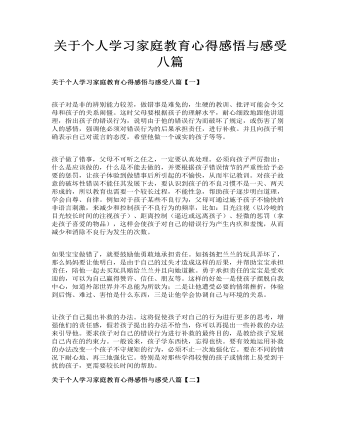
关于个人学习家庭教育心得感悟与感受八篇
孩子做了错事,父母不可听之任之,一定要认真处理。必须向孩子严厉指出:什么是应该做的,什么是不能去做的,并要根据孩子错误情节的严重性给予必要的惩罚,让孩子体验到做错事后所引起的不愉快,从而牢记教训。对孩子故意的破坏性错误不能任其发展下去,要认识到孩子的不良习惯不是一天、两天形成的,所以教育也需要一个较长过程,不能性急,帮助孩子逐步明白道理,学会自尊、自律。例如对于孩子某些不良行为,父母可通过施予孩子不愉快的非语言刺激,来减少和控制孩子不良行为的频率,比如:目光注视(以冷峻的目光较长时间的注视孩子)、距离控制(逼近或远离孩子)、轻微的惩罚(拿走孩子喜爱的物品),这样会使孩子对自己的错误行为产生内疚和羞愧,从而减少和消除不良行为发生的次数。
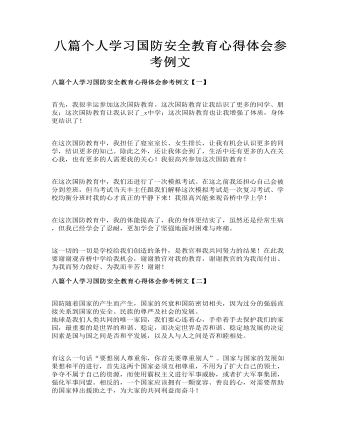
八篇个人学习国防安全教育心得体会参考例文
国防随着国家的产生而产生,国家的兴衰和国防密切相关,因为过分的强弱直接关系到国家的安全、民族的尊严及社会的发展。 地球是我们人类共同的唯一家园,我们要心连着心,手牵着手去保护我们的家园,最重要的是世界的和谐、稳定,而决定世界是否和谐、稳定地发展的决定因素是国与国之间是否和平发展,以及人与人之间是否和睦相处。 有这么一句话“要想别人尊重你,你首先要尊重别人”。国家与国家的发展如果想和平的进行,首先这两个国家必须互相尊重,不用为了扩大自己的领土,争夺不属于自己的资源,而使用霸权主义进行军事威胁,或者扩大军事集团,强化军事同盟。相反的,一个国家应该拥有一颗宽容、善良的心,对需要帮助的国家伸出援助之手,为大家的共同利益而奋斗!
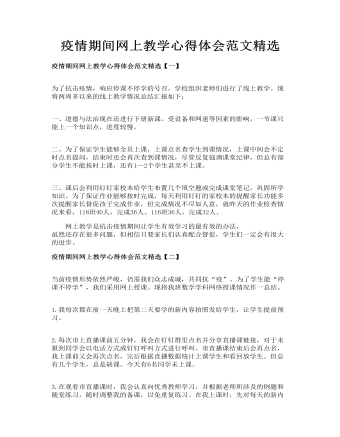
疫情期间网上教学心得体会范文精选
二、为了保证学生能够全员上课,上课点名查学生到课情况,上课中间会不定时点名提问,结束时还会再次查到课情况,尽管反复强调课堂纪律,但总有部分学生不能按时上课,还有1—2个学生甚至不上课。 三、课后会利用钉钉家校本给学生布置几个填空题或完成课堂笔记,巩固所学知识。为了保证作业能够按时完成,每天利用钉钉的家校本的提醒家长功能多次提醒家长督促孩子完成作业,但完成情况不尽如人意,就昨天的作业检查情况来看,118班40人,完成36人。116班36人,完成32人。
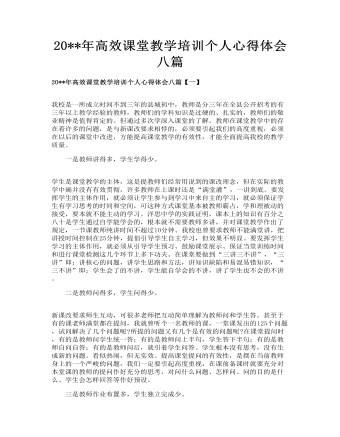
高效课堂教学培训个人心得体会八篇
一是教师讲得多,学生学得少。 学生是课堂教学的主体,这是提教师们经常用说到的课改理念,但在实际的教学中确并没有有效贯彻,许多教师在上课时还是“满堂灌”,一讲到底。要发挥学生的主体作用,就必须让学生参与到学习中来自主的学习,就必须保证学生有学习思考的时间和空间,可这种方式课堂基本被教师霸占,学和理被动的接受,要本就不能主动的学习。洋思中学的实践证明,课本上的知识有百分之八十是学生通过自学能学会的,根本就不需要教师多讲,并对课堂教学作出了规定,一节课教师纯讲时间不超过10分钟。我校也曾要求教师不能满堂讲,把讲授时间控制在25分钟,提倡引导学生自主学习,但效果不明显。要发挥学生学习的主体作用,就必须从引导学生预习、鼓励课堂展示、保证当堂训练时间和进行课堂检测这几个环节上多下功夫。在课堂要做到“三讲三不讲”,“三讲”即:讲核心的问题,讲学生思路和方法,讲知识缺陷和易混易错知识,“三不讲”即:学生会了的不讲,学生能自学会的不讲,讲了学生也不会的不讲。
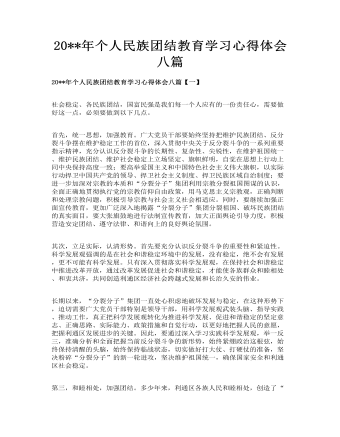
个人民族团结教育学习心得体会八篇
我国作为一个多民族融合的国家,在其发展的过程中都必须考虑到社会各方面的问题。五十六个民族的大家庭需要我们每个人都有一颗宽容的心,用自己的包容心态去处理生活中的每一件事,去处理好各民族的关系。民族团结是一个国家能稳定及更好发展的前提条件,历史的镜子告诉我们,由于民族矛盾,民族歧视所引发的各民族之间的战争和冲突给与了我们的忠告;各民族之间的友好交流,相互学习则在一定程度上促进了民族关系的友好发展,友好交往成为贯穿历史的主流。事实证明中华民族作为世界上秀的民族之一,在社会主义现代化建设的今天取得如此重大的成就,正是因为我们的民族能紧紧的融合在一起,我们能处理好各民族之间的关系,是爱国力量的凝聚,是所有中华儿女的共同努力。
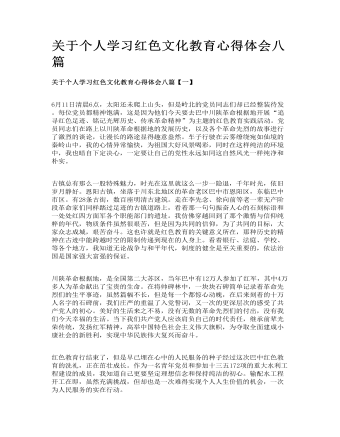
关于个人学习红色文化教育心得体会八篇
古镇总有那么一股特殊魅力,时光在这里就这么一步一隐退,千年时光,依旧岁月静好。恩阳古镇,坐落于川东北地区的革命老区巴中市恩阳区,东临巴中市区。有28条古街,数百座明清古建筑。走在李先念、徐向前等老一辈无产阶段革命家们同样踏过足迹的古镇道路上,看着那一句句振奋人心的石刻标语和一处处红四方面军各个职能部门的遗址。我仿佛穿越回到了那个激情与信仰纯粹的年代,物质条件虽然很艰苦,但是因为共同的信仰,为了共同的目标,大家众志成城,艰苦奋斗。这也许就是红色教育的关键意义所在,那种历史的精神在古迹中能跨越时空的限制传递到现在的人身上。看着银行、法庭、学校、等各个地方,我知道无论战争与和平年代,制度的健全是至关重要的,依法治国是国家强大富强的保证。
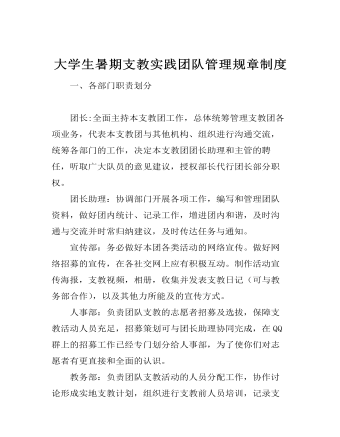
大学生暑期支教实践团队管理规章制度
团长助理:协调部门开展各项工作,编写和管理团队资料,做好团内统计、记录工作,增进团内和谐,及时沟通与交流并时常归纳建议,及时传达任务与通知。 宣传部:务必做好本团各类活动的网络宣传。做好网络招募的宣传,在各社交网上应有积极互动。制作活动宣传海报,支教视频,相册,收集并发表支教日记(可与教务部合作),以及其他力所能及的宣传方式。 人事部:负责团队支教的志愿者招募及选拔,保障支教活动人员充足,招募策划可与团长助理协同完成,在QQ群上的招募工作已经专门划分给人事部,为了使你们对志愿者有更直接和全面的认识。 教务部:负责团队支教活动的人员分配工作,协作讨论形成实地支教计划,组织进行支教前人员培训,记录支教生活,每次支教每个支教点最少要有两篇支教生活记录、感悟或实践报告。 二、各部门工作细则 (一)、团长 .团长在进入招募期后,应与时刻与支教点主要负责人保持联系,认真选好地点,尽可能保证整个团队支教地点的安全。 2.团长要定期和团长助理,各部门主管、成员开会,及时了解团内活动进程,安排部署,统筹规划。 3.团长负责监督团内所有事务活动的展开,并及时督促。
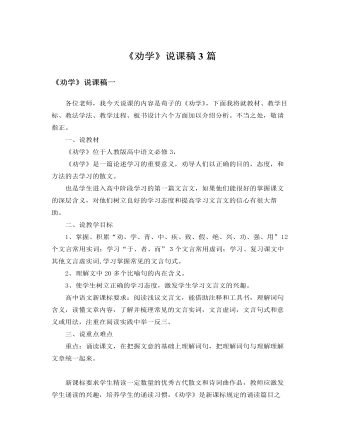
人教版高中语文必修3《劝学》说课稿3篇
《劝学》是普通高中课程标准试验教科书语文必修三第三单元的重点篇目,该文集中反映著名思想家荀子在学习问题上的观点和精彩斐然的论证艺术。该单元所选课文都是古代的议论性散文。通过本单元的学习在于让学生感受我国传统文化的精神,掌握基础的文言语法知识,学习如何清晰有力的表达自己的思想和见解。本文安排在单元的第一篇,如何指导学生学好这篇课文,是实现“授之以渔”,树立学生学好文言文的信心,掌握文言学习方法的关键。根据新课标倡导从“知识与能力”、“过程与方法”、“情感态度与价值观”三方面出发设计课程目标的要求和高一的学生对于文言文的知识还在积累的阶段,应该注重基础知识的积累和一定量的诵读的实际情况。我拟确定以下教学目标:1,了解荀子论述学习的思想,明确学习要靠积累、坚持不懈、专心致志的道理。2,掌握积累文言实词、虚词,活用、古今异议等现象和固定句式。

人教版高中历史必修3宋明理学说课稿3篇
陆王心学与程朱理学相比有何异同?生 不同点:在理的内涵上不同,程朱理学认为“理”是贯通于宇宙、人伦的客观存在,是一种普遍的规律准则;陆王心学认为心即理,是“良知”,认为人心便是世界万物的本原。方法上也有不同:前者向外追究,“格物致知”;后者向内探求,“发明本心”以求理,克服私欲、回复良知。生 相同点:都提出了一个宇宙、社会、人生遵循的“理”。师 对。程朱理学是客观唯心主义,阳明心学是主观唯心主义。这两者的分歧是理学范围内的分歧,其基本思想是一致的。师 宋明理学与汉唐以前的儒学比较,最大的特点在于批判地吸收了佛教哲学的思辨结构和道教的宇宙生成论,将儒家的伦理学说概括升华为哲学基本问题。其实质是把佛、道“养性”“修身”引向儒家的“齐家”“治国”“平天下”,对儒家的纲常道德给予哲学论证,使之神圣化、绝对化、普遍化,以便深入人心,做到人人遵而行之。
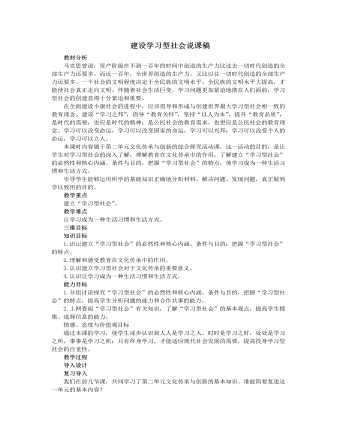
人教版高中政治必修3建设学习型社会说课稿
解析:材料是讲学习型社会所产生的影响,A项观点错误,在当前和今后相当长的时间里,学校教育仍然是人们获得知识的最重要的途径。B项观点错误,终身学习只是成就人生目的的手段、途径,而不是目的本身。D项说法错误,当前我国社会的中心工作是经济建设。二、问答题5.材料一:日本是公认的漫画大国,日本的动漫产业产值每年230万亿日元,成为日本的第二大支柱产业。在日本,漫画比电影、小说有时甚至比电视或音乐更受欢迎。日本漫画的热潮还席卷了世界:日本每年出口到美国的卡通片价值就达5 000亿日元,是日本对美国钢铁出口金额的4倍;漫画中的人物被迅速复制成电子游戏、卡通片及真人演出的节目。原来只是闲暇时候消遣的漫画,正飞速渗透到人们的生活中。值得警惕的是,除了催人奋进的精华之外,日本漫画中也存在暴力、色情、扭曲历史等诸多糟粕,对缺乏辨别能力的青少年产生了许多不良影响,更引发了一系列深刻的社会问题。

人教版高中政治必修4生活处处有哲学说课稿
(二)组织学生探究知识并形成新的知识。我从学生的生活体验入手,运用案例等形式创设情境呈现问题,使学生在自主探索、合作交流的过程中,发现问题、分析问题、解决问题,在问题的分析与解决中主动构建知识。主要通过几幅漫画让学生思考其中的哲学道理,开始接触哲学。漫画一:种瓜得瓜,种豆得豆,种鸡蛋得??漫画二:甲:下雨好极啦!乙:下雨糟透了!漫画三:——狂妄之徒,你竟然坏了祖上规矩!在引导学生思考、体验问题的过程中,可以使学生逐步学会分析、解决问题的方法。这样做既有利于发展学生的理解、分析、概括、想象等创新思维能力,又有利于学生表达、动手、协作等实践能力的提高,促进学生全面发展,力求实现教学过程与教学结果并重,知识与能力并重的目标。

人教版高中历史必修3文艺复兴和宗教改革教案
三、宗教改革:1、背景:(1)文艺复兴的影响。文艺复兴中,人文主义学者尽管对宗教保持较为温和的态度,但其以人为中心的思想极大地冲击了天主教的精神独裁,天主教的权威日益受到人们的怀疑。(2)天主教会对欧洲尤其是德意志的压榨。中世纪的天主教会对人民进行严密的精神统治,基督教信仰的核心是“原罪”和“灵魂救赎”,即人生下来就有罪,只有信仰上帝,跟随耶稣才能得救。就“灵魂救赎”而言,最初强调的是个人信仰的作用,后来,神学家们又加上了种种繁杂的宗教礼仪,而且必须得到神职人员的帮助,灵魂才能得救。在经济上,天主教会还是最大的封建主,占有大量的土地,并征收什一税,对各国人民大肆搜刮。罗马教廷每年从德意志搜刮的财富达30万古尔登(货币单位),相当于“神圣罗马帝国”皇帝每年税收额的20倍。德意志也成了被教会榨取最严重的地区,素有“教皇的乳牛”之称。
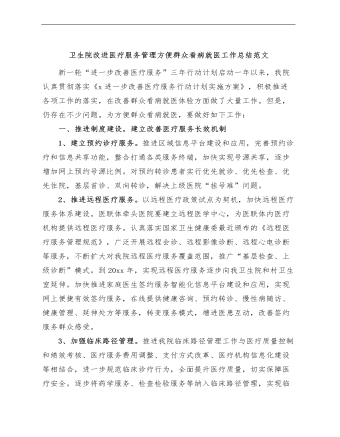
卫生院改进医疗服务管理方便群众看病就医工作总结医院汇报报告
三、切实加强领导,落实改善医疗服务工作责任1、加强组织管理,务求工作实效。要坚持以人为本,以病人为中心,切实加强组织领导,深入贯彻落实《x进一步改善医疗服务行动计划实施方案》,牢固树立服务意识,做好调研分析,以问题为导向,加强监督和指导,持续改进医疗服务管理,要统筹协调医疗资源,不断完善医疗信息化建设,加强人力资源管理,科学设计服务流程,为改善医疗服务提供基本保障,让人民群众切实感受到改善医疗服务行动计划带来的看得见摸得着的实惠。2、树立典型示范,推广先进经验。要不断发掘和树立改善医疗服务的先进典型,认真总结推广先进经验,宣传推广一批示范岗位、示范个人,形成典型带动、示范引领的工作氛围。要将宣传工作与改善医疗服务同步推进,加强与各类媒体的沟通合作,做到集中宣传与日常宣传相结合,传统媒体宣传与新兴媒体宣传相结合,持续宣传改善医疗服务典型和成效。

新人教版高中英语必修3Unit 1 Festivals and celebrations-Discovering Useful Structure教学设计
4.That was an experience that frightened everyone. →That was _____________________. 答案:1. taking 2. being discussed 3. in the reading room 4. a frightening experienceStep 6 The meaning and function of V-ing as the predicative动词-ing形式作表语,它通常位于系动词后面,用以说明主语“是什么”或“怎么样”一种表示主语的特质、特征和状态, 其作用相当于形容词; 另一种具体说明主语的内容, 即主语等同于表语, 两者可互换。The music they are playing sounds so exciting. 他们演奏的音乐听起来令人激动。The result is disappointing. 结果令人失望。Our job is playing all kinds of music. 我们的工作就是演奏各种音乐。Seeing is believing. 眼见为实。Step 7 Practice1. It is ________(amaze) that the boy is able to solve the problem so quickly.2. Buying a car is simply _______(waste) money. 3. Please stop making the noise—it’s getting ________(annoy). 4. complete the passage with the appropriate -ing form.La Tomatina is a festival that takes place in the Spanish town Bunol every August. I think many food festivals are __________ because people are just eating. however, this festival is _________ because people don't actually eat the tomatoes. Instead, they throw them at each other! the number of people ________ part in this tomato fight, can reach up to 20,000, and it is a very __________ fight that lasts for a whole hour. The _______ thing is how clean Bunol is after the tomatoes are washed away after the fight. this is because the juice form tomatoes is really good for making surfaces clean!答案:1. amazing 2. wasting 3. annoying4. boring interesting taking exciting amazing

新人教版高中英语必修3Unit 1 Festivals and Celebrations-Reading and Thinking教学设计
The topic of this part is “Discover the reasons for festivals and celebrations.The Listening & Speaking & Talking part aims at talking about the experiences and feelings or emotions about the festivals and celebrations. This section aims at detecting the reason why the people celebrate the festivals, the time, the places, the types and the way of celebrations. It also explains why some traditions in the old celebrations are disappearing, like the firecrackers in the big cities and some new things are appearing like the prosperity of business or commerce. 1. Students can talk about what festivals they know and the reasons and the way of celebrating them.2. Students should learn the reading skills such as the headline and get the topic sentences, the structures of articles.3. Students can understand the past, the present situation of some festival around the world and why there are some changes about them. 4. Students can have the international awareness about the festivals.1. Students should learn the reading skills such as the headline and get the topic sentences, the structures of articles.2. Students can understand the past, the present situation of some festival around the world and why there are some changes about them.Step 1 Lead in---Small talkWhat festival do you like best ? Why ?I like the Spring Festivals because I can set off the fireworks, receive the lucky money and enjoy the Gala with my families.Step 2 Before reading---Pair workWhy do people celebrate different festivals ?The Spring Festivals is to celebrate the end of winter and the coming of spring and new life.The Mid-autumn Day is to celebrate the harvest and admire the moon.

新人教版高中英语必修3Unit 1 Festivals and Celebrations-Listening &Speaking&Talking教学设计
The theme of this section is “Talk about festival activities and festival experiences”.Festival and holiday is a relaxing and interesting topic for students. This part talks about the topic from the daily life of students’. In the part A ---Listening and Speaking, there are three conversations among different speakers from three countries(Japan, Rio and China), where the speakers are participating in or going to participate in the festivals and celebrations. So listening for the relationship among them is a fundamental task. Actually, with the globalization and more international communication, it is normal for Chinese or foreigners to witness different festivals and celebrations in or out of China. In the Conversation 1, a foreign reporter is interviewing a Japanese young girl who just had participated in the ceremony of the Coming-of-Age Day on the street and asking her feeling about the ceremony and the afterwards activities. Conversation 2, Chinese girl Li Mei is witnessing the Rio Carnival for the first time, and her friend Carla gives her some advice on the costumes which enables her to match with the carnival to have a good time. Conversation 3, a Chinese guide is showing a group of foreign visitors around the Lantern Festival and introducing the customs of the festival to them. The three conversations have a strong vitality and insert the festival and cultural elements from different countries. So perceiving the festivals and cultures from different countries is the second task. At the same time, the scripts also insert the targeted grammar --- v-ing as attributive and predicative, which students can perceive and experience in a real context and make a road for the further study. That is the third task. In the Part B--- Listening and Talking, the theme is “Talk about festival experience”, which is the common topic in our daily conversations. During the conversation, Song Lin, a Chinese student, asked Canadian friend Max about how to spend Christmas. In the conversation, Song Lin talked about experience and the feelings during the Chinese Spring Festival, during which there are not only some enjoyable things but some unpleasant things. After the listening, perhaps students find there are some similarities between Christmas and the Chinese Spring Festival as there are some differences in the origins and celebrations. For example, people always visit friends and relatives, decorate their houses, have a big dinner together, chat and give presents to each other.

新人教版高中英语必修3Unit 1 Festivals and Celebrations-Reading for writing教学设计二
Step 3 Analyzing article structureActivity 31. Teachers raise questions to guide students to analyze the chapter structure of this diary and think about how to describe the festival experience. (1)What should be included in the opening/body/closing paragraph(s)?(2)How did the writer arrange his/her ideas?(3)What kind of interesting details did the writer describe?(4)How did the writer describe his/her feelings/emotions during the event?2. Students read and compare the three sentence patterns in activity 2. Try to rewrite the first paragraph of the diary with these three sentence patterns. After that, students exchange corrections with their partners. Such as:●This was my first time spending three days experiencing the Naadam Festival in China’s Inner Mongolia Autonomous Region and it was an enjoyable and exciting experience. ●I'll never forget my experience at the Naadam Festival because it was my first time to watch the exciting Mongolian games of horse racing, wrestling, and archery so closely. ●I'll always remember my first experience at the Naadam Festival in China’s Inner Mongolia Autonomous Region because it was so amazing to spend three days witnessing a grand Mongolian ceremony. Step 4 Accumulation of statementsActivity 41. Ask the students to read the diary again. Look for sentences that express feelings and emotions, especially those with the -ing form and the past participle. Such as:● …horse racing, wrestling, and archery, which are all so exciting to watch. ● some amazing performances● I was surprised to see…● I was a little worried about. . . ● feeling really tiredOther emotional statements:●I absolutely enjoyed the archery, too, but the horse races were my favourite part. ●I'm finally back home now, feeling really tired, but celebrating Naadam with my friend was totally worth it. ●He invited me back for the winter to stay in a traditional Mongolian tent and cat hot pot. I can’t wait!2. In addition to the use of the -ing form and the past participle, the teacher should guide the students in the appreciation of these statements, ask them to memorize them, and encourage them to use them reasonably in writing practice.

新人教版高中英语必修3Unit 1 Festivals and Celebrations-Reading for Writing教学设计一
The topic of this part is “Write about your festival experience”.During the Listening and Speaking and Talking, students are just asked to say out their festival experiences such as the Spring Festival, Mid-autumn Day, but this part students will be asked to write down their own festival experiences. During the reading part, it introduces the Naadam Festival in Inner Mongolia Autonomous Region, which can give students a good example to imitate. Students not only learn the festival, but touch and feel the Inner Mongolian’s character, the spirit and cultural atmosphere, which can help students form the cultural awareness and learn to enjoy and value the diversity of Chinese culture.Concretely, the dairy tells the experience that the author spent the Naadam Festival in Inner Mongolia Autonomous Region with his/her friend. The structure is clear. In the opening paragraph, it introduces the topic of the Naadam Festival and the whole feeling. Then it introduces the items of the festival like the ceremony, wrestling and horse racing. Finally, it summarizes this experience. Because this part is a travel journal, we must guide students pay more attention to these details: 1. use the first person. 2. use the past tense to tell the past thing and use the present or future tense to describe the scenery. 3. use the timeline to tell the development. 4. be careful for the author’s psychology, emotion and feeling, etc.1. Read quickly to get main idea; read carefully to get the detailed information about Naadam Festival.2. Learn the structure of the reading article and language.3. Write an article about a festival experience4. Learn to use the psychology, emotions and feeling in the writing.1. Write an article about a festival experience.2. Use the structure of the reading article and language.

新人教版高中英语必修3Unit 2 Morals and Virtues-Discovering Useful Structure教学设计
1. 表示时间。Hearing these stories, I’m skeptical about the place. = When I heard these stories. . . 2. 表示原因。Not knowing his address, I can’t send this book to him. = Because/Since/As I don’t know his address. . . 3. 表示结果。His father died, leaving him a lot of money. =. . . and left him a lot of money4. 表示条件。Going straight down the road, you will find the department store. = If you go straight down the road. . . 5. 表示让步。Being tired, they went on working. =Although they were tired. . . 6. 表示行为方式、伴随情况或补充说明。He lay on the grass, staring at the sky for a long time. =. . . and stared at the sky for a long time注意:非谓语动词作状语时, 如所提供的动词不能和句子中的主语保持一致, 动词-ing形式必须有自己的逻辑主语, 通常由名词或代词来担任, 这就是独立主格结构。The last bus having gone, we had to walk home. (having gone的逻辑主语是the last bus, 而不是we)Weather permitting, the football match will be played on Friday. (permitting的逻辑主语是time, 而不是the football match)Step 7 Practice1. ________(study) hard, you are sure to get first prize. 2. People use plastic in their daily life, _______(leave) large amounts of waste. 3. ________(work) hard at your lessons, you are to succeed. 4. The old man, ____________(work) abroad for twenty years, is on the way back to his motherland. 5. ______________(finish) his homework, he was playing on the playground. Answers: 1. Studying 2. leaving 3. Working 4.having worked 5. Having finishedStep 8 HomeworkFinish the homework on Page 22.

新人教版高中英语必修3Unit 2 Morals and Virtues-Listening &Speaking&Talking教学设计
Example:One day, a poor boy who was trying to pay his way through school by sending newspapers door to door found that he only had one dime(一角)left. He was so hungry that he decided to beg for a meal at the next house.However, he lost his nerve when a lovely young woman opened the door. Instead of a meal he asked for a drink of water. She thought he looked hungry so she brought him a large glass of milk. He drank it slowly, and then asked, “How much do I owe you?” “You don’t owe me anything,” she replied, “Mother has taught me never to accept pay for a kindness.” “Then I thank you from the bottom of my heart.” With these words, Howard Kelly left that house.Years later the woman became badly ill and was finally sent to the hospital in a big city. Dr. Howard Kelly, now famous, was called in. When he heard the name of the town she came from, a strange light filled his eyes. Dressed in his doctor’s clothes, Dr. Kelly went into her room and recognized her at once. From that day on, he gave special attention to her, and decided to do his best to save her life.At last the woman was saved. Dr. Kelly asked the business office to pass the final bill to him. He looked at it and then wrote something on the side. The bill was sent to the woman’s room. She was afraid to open it because she was sure that it would take the rest of her life to pay for it off. Finally she looked, and the note on the side of the bill caught her attention. She read these words: “Paid in full with a glass of milk, Dr. Howard Kelly.” Tear of joy flooded her eyes.


